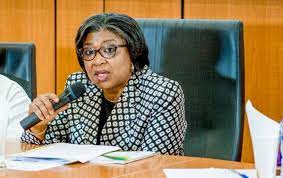The Debt Management Office (DMO), on Thursday reacted to growing concerns about Nigeria’s surging debt stock, saying there is no need for alarm as the debt remains manageable based on the existing debt management strategy.
The DMO Director-General, Ms. Patience Oniha, in a statement in which she specifically reacted to media reports that the incoming administration would inherit about N77 trillion debt liability, pointed out that Nigeria’s debt would only attain that level when the Ways and Means Advances from the CBN were securitised.
According to her, the securitisation of the Ways and Means Advances will enable the DMO to include the debt in the public debt stock thereby improving debt transparency.
On Wednesday during the public presentation of the breakdown of the 2023 Budget by the Minister of Finance, Budget and National Planning, Mrs. Zainab Ahmed, the DMO boss in her contribution had explained that currently the actual public debt stock stood at N44 trillion.
Oniha maintained that the total debt stock included external and domestic debts of the Federal Government, the 36 state governments and the FCT.
She further clarified: “Taking into account a number of on-going activities, the total public debt stock; that is the external and domestic debts of the Federal Government, the 36 state governments and the FCT would be about N77 trillion.
“The debts that will be added to the public debt data in 2023 include the N1 trillion Ways and Means Advances to finance the supplementary budget. This has already been approved by the National Assembly (NASS).
“It also includes N22.72 trillion Ways and Means Advances currently under the consideration by the NASS.
“The projected debt stock for May 2023 also includes N5.567 trillion, representing about 50 per cent of the new borrowing of N11.134 trillion in the 2023 Appropriation Act.
“It also includes new Promissory Notes estimated at N1.5 trillion to be issued to settle arrears of the FGN and judgment debts.
“From these figures, it is clear that the Ways and Means Advances of N22.72 trillion which represents funds already spent, is the largest source of the increase”, Oniha added.






